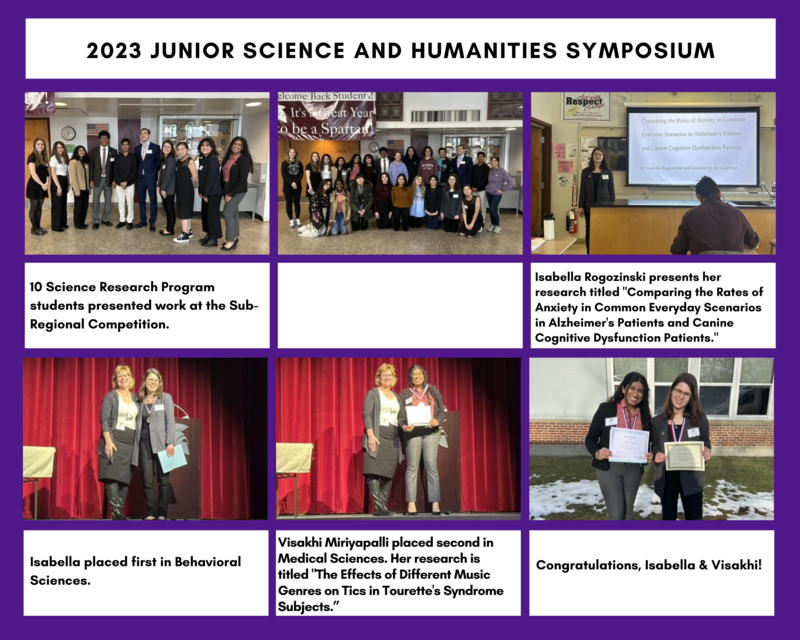Under the guidance of Jessica Puopolo and Ashley Taylor in the Science Research Program, MWHS had 10 students present their work at the Eastern Section JSHS Sub-Regional Symposium in Burnt Hills on Saturday. Congratulations to all student presenters, especially two students who earned first and place honors:
- Isabella Rogozinski placed first in Behavioral Sciences
Visakhi Miriyapalli placed second in Medical Sciences
These students will move on to present their work at the Junior Science and Humanities Symposium (JSHS) Regional Competition in Albany on March 8 and 9. Congratulations on a job well done!
Isabella's research is titled "Comparing the Rates of Anxiety in Common Everyday Scenarios in Alzheimer's Patients and Canine Cognitive Dysfunction Patients."
Her abstract is as follows:
Alzheimer's and canine cognitive dysfunction are natural models of each disease, and progression symptoms in Alzheimer's disease (AD) are evident in canine cognitive dysfunction (CDS). One of the major symptoms for both diseases is anxiety. The purpose of this study was to examine the anxiety experienced in AD and CDS patients in everyday scenarios, to determine the frequency and severity of anxiety experienced in both patient populations. Through the surveys, the scenarios of change in routine and new environments/locations presented with significance for both frequency and severity for both patient populations. Consideration of different scenarios with the frequency and severity of anxiety can help improve quality of life for patients of AD, CDS, and their caregivers.
Visakhi's research is titled "The Effects of Different Music Genres on Tics in Tourette's Syndrome Subjects.”
Her abstract is as follows:
Studies on music and music therapy have shown a variety of effects on humans, both mentally and physically. There have been a multitude of studies evaluating how music can influence a variety of mental and physical disorders. Tourette's Syndrome (TS) is a mental disorder that has been shown to be strongly affected by music. The primary symptoms of TS are tics, which are involuntary physical or verbal movements. This study examines how different genres of music can have an effect on tics in Tourette's Syndrome subjects. There were a total of 7 participants in this study, each listening to 4 different genres of music, with and without earphones. The results demonstrate that a subject's personal preference and opinion of the music has a larger effect rather than specific music genres themselves. Other factors of music and tics were looked at more closely as well. This study was an online study performed and created after the COVID-19 pandemic, helping to continue Tourette's Syndrome research, even in an online or remote setting.

